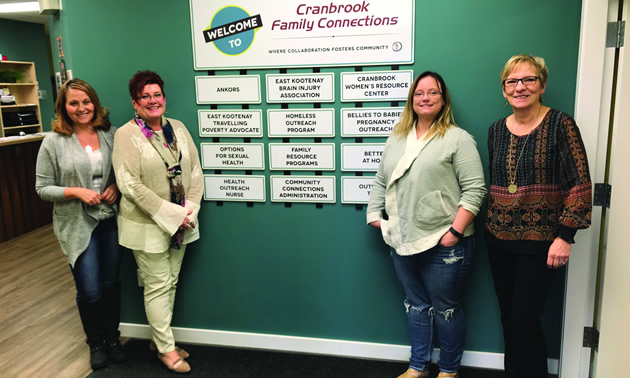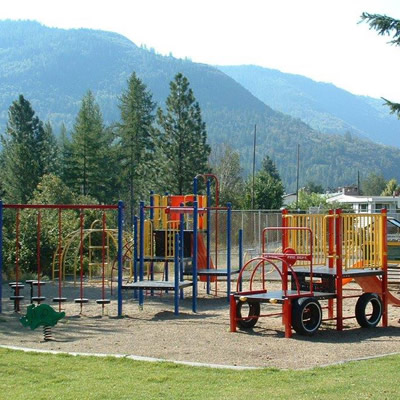College of the Rockies research shows the vital role Cranbrook Family Connections (CFC) has in area
Cranbrook Family Connections has been providing programs and services to Cranbrook and the East Kootenay region for 36 years

Research completed by College of the Rockies instructor, Shawna Ryan, highlights the vital role played by Cranbrook Family Connections. Pictured (l-r) Tracy Pound (Homeless Outreach Program), Kim Levie (Cranbrook Family Connections), Erin Pan (Homeless Outreach Program), Gwen Noble (Executive Director, Community Connections Society of BC). — Photo courtesy College of the Rockies
College of the Rockies’ Bachelor of Science in Nursing instructor Shawna Ryan and Gwen Noble, Executive Director, Community Connections Society of Southeast British Columbia, recently partnered on an applied research project aimed at understanding and improving health and social services to area residents.
Cranbrook Family Connections (CFC), a hub of services offered by the Community Connections Society of Southeast British Columbia, has been providing programs and services to Cranbrook and the East Kootenay region for 36 years.
“As a non-profit organization, CFC is reliant on external funding, which is why we need to explicitly understand and be able to convey our collective impact on health and social service in our community,” said Noble. “We knew that partnering with College of the Rockies would give us access to reliable, detailed research and robust data that we could use to accurately communicate the important work we do here and what it means for our clients and community.”
Ryan’s specific objective was to assess the advantages of a co-located, comprehensive, and collective approach to the delivery of social and health services, gather demographic data of CFC clients, and evaluate the diversion of CFC clients from emergency and other health care services.
The research resulted in a Collective Impact Report, which will be used to support CFC’s applications for funding. It will also be circulated to local dignitaries and community leaders to help inform them on underserved populations.
“Research results verified much of what CFC staff knew anecdotally,” said Ryan. “Clients access multiple services during a single visit, as well as over the course of their visits to CFC, validating the belief that having multiple health and social services located under one roof makes CFC more effective.”
“Those who are accessing services are primarily females (72 per cent) who are young to middle-aged adults. Most clients would be considered low-income and many have dependents. The research also supported the belief that many clients access CFC on a regular (weekly or monthly) basis.”
Of the 161 clients surveyed, 53 indicated that if the health and social services at CFC were not available, they would have gone to their physician, nurse practitioner and/or the emergency room instead.
“This demonstrates the significant impact of the CFC,” Noble added. “Having these services available under one roof results in us being able to divert clients from further taxing an already congested public health care system.”
Eighty-five respondents indicated that they would go “nowhere” if it were not for CFC services, highlighting the important role the CFC plays in decreasing social isolation of its clientele.
Going forward, Noble is confident this research will help with future funding applications.
“This data clearly demonstrates the demographics of CFC’s current clientele and also showed segments of the population that may be underserved,” Noble added. “This information not only bolsters our ongoing funding applications, but provides valuable information for applying for funds to serve additional client groups.”
Learn more about the services provided by Cranbrook Family Connections at: cfc.ccscranbrook.ca/
For more information about College of the Rockies applied research opportunities, contact Gaby Zezulka, Chair of Academic Innovation and Applied Research at 250-489-2751 ext. 3287 or [email protected]
About College of the Rockies
For more than 40 years, College of the Rockies has provided post-secondary education that meets the needs and aspirations of the people, industry and businesses of our region. Each year, we deliver instruction to approximately 10,000 learners, in a full range of programs, including: skilled trades, university studies, adult upgrading, early childhood education, health and human services, business, office administration, tourism and recreation, fire services, continuing education and general community interest. Through smaller class sizes, highly-personalized instruction and dedicated support services, our students are primed to succeed in the job market, or in the next stage of their academic journey.





Comments